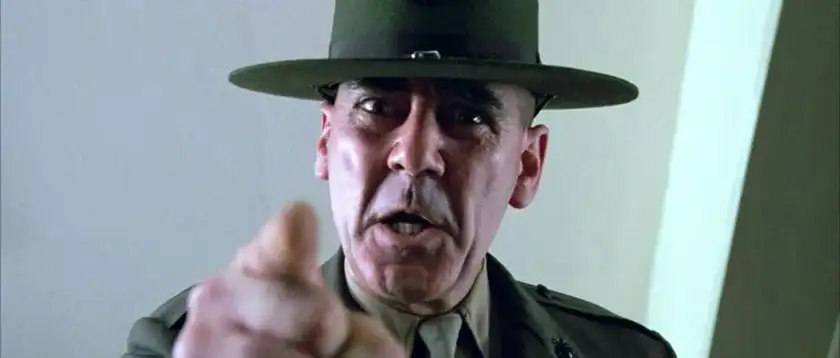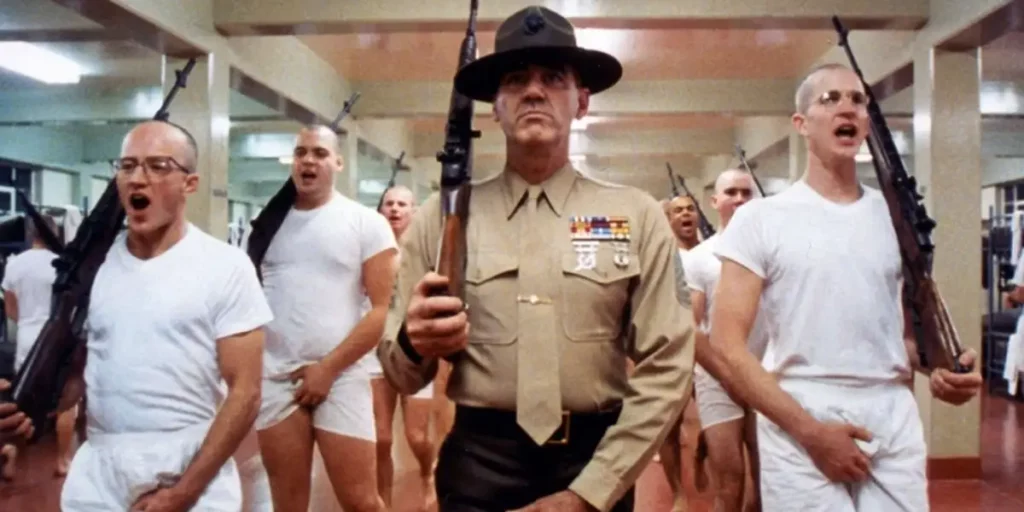The last of Stanley Kubrick’s films to be released during his lifetime, Full Metal Jacket has a narrative that packs a punch and incredible performances.
There was only one film that I considered reviewing for Kubrick Month here at Loud and Clear Reviews. Sure, it might have been fun to cover a blind spot, but I had an urge to revisit my personal favorite (please note however that I did not say that I consider this to be his best). 1987’s Full Metal Jacket, for a multitude of reasons, is the Kubrick film that I cared enough about to own.
Watching it now proved to be more interesting than I had anticipated, especially with the current conflict in Gaza being on my mind. My thought process going in was that I would praise certain things about Full Metal Jacket, such as Stanley Kubrick’s direction, rate the film five out of five stars and move on. This watch was harder to get through as I constantly found parallels to the present. A film from 1987 expressed to me how much America and the world at large had both changed and not changed since the Vietnam War which is depicted in a fictional capacity here. By the end, I was left rather shaken and needing to decompress a bit. It has taken me a bit, as you can imagine, to sit down at my computer and write this review, but I am going to do my best to try and encapsulate my feelings, no matter how long it takes.
Full Metal Jacket follows a platoon of United States Marines through their boot camp training in Marine Corps Recruit Depot Parris Island, South Carolina. The film centers on the experiences of Privates J. T. “Joker” Davis (Matthew Modine) and Leonard “Gomer Pyle” Lawrence (Vincent D’Onofrio) as they experience rigorous, abusive training at the hands of Gunnery Sergeant Hartman (R. Lee Ermey). Audiences then follow Joker and other marines during the Tet Offensive of the Vietnam War.
In terms of story and structure, writers Stanley Kubrick, Michael Herr, and Gustav Hasford have done quite the job of crafting something that shows the perspective of multiple characters well. They make it clear to audiences that we are going to see things mostly through the eyes of Joker and Pyle early on and use both to make points.
With Matthew Modine’s Joker, we see multiple sides of an American soldier and the conflict some may have felt in Vietnam. Joker remarks in his first confrontation with Sergeant Hartman that he joined the Marines to kill and yet, audiences, even in that moment can see that is not entirely the case. He represents those that joined the armed forces because they felt a duty to their country and yet does not fully understand what he is getting into. There is a primal instinct to defend his home, which Joker fights against throughout, and then there is the softer, gentler side of him struggling to hold on as he witnesses the horrors of war in Vietnam.
So many young American men lost their lives during the Vietnam War, and Full Metal Jacket depicts this with plenty of brutality. However, what is more important to the writers is to showcase how many of them lost their innocence and even their humanity out there for a conflict that not all of them could grasp. That is part of what makes Joker’s arc and the film so incredibly tragic. There is also the fact that this cycle has not ended, governments are still sending soldiers, money, and weapons to wherever they wish without even considering if they should be. This makes the narrative just as timely as it was when originally released. These things are still going on, and in a lot of cases, it should make you feel as uneasy as I did while watching this film that they are.

Modine’s performance adds to that unease, as he appears to fully get lost in the character of Joker. He keeps up a positive energy, but his facial expressions tell a different story. You will see a man struggling with what he is seeing in Vietnam, fighting off his training and fear to maintain some sort of humanity. The script lets his words convey that somewhat, but it is up to Modine to make you believe them. He truly makes you feel like Joker could go either way and does not necessarily have to give in to the “Born to Kill” label he wrote on his helmet. The work Modine does makes the film exponentially better.
Speaking of performances, Vincent D’Onofrio gives what, outside of his role as Wilson Fisk/Kingpin in various Marvel series, is his defining contribution as an actor in Full Metal Jacket. As Private Leonard “Gomer Pyle” Lawrence, D’Onofrio encapsulates the impact that military brainwashing can have on soldiers and their mental health in a way that is better than expected. Like Joker, I suspect Leonard or Gomer Pyle, as Hartman nicknames him, had no real idea what he was getting into, but wanted to protect his home. Pyle is overweight and does not appear to be the smartest individual, and Sergeant Hartman is toughest on him as a result. While some would argue that the Sergeant was just doing what was best to prepare the private for war, he does it in a way that is too much. The level of disgust and disrespect Hartman shows towards Pyle, who is trying, but just unfit, takes a toll on the mental health of the young man.
Leonard is absolutely broken by training and D’Onofrio captures his evolution in a way that is utterly terrifying and heartbreaking. This performance is an unfortunate picture of the reality that some soldiers face when they decide to go to war and even when they come home. Their minds are wired differently in training, and some just cannot handle it, no matter how hard they try.
In the midst of all this tragedy, Full Metal Jacket also has moments of comedy that serve as a brief relief. They should not be funny, particularly the cadences spouted by Hartman and the privates, but several, if not all, of them will get a laugh out of you. The comedy may be the main portion of this film that has not aged as well, but they are certainly needed in a film that takes its toll on you.
One other criticism I have is that this is, for most of its runtime, a distinctly American male point of view of the Vietnam War. Part of me believes that is the point because of the rather impactful ending that this film has. We rarely see anything but the perspective of an American soldier and while that makes the film work in a lot of aspects, it can also harm it. There is little doubt that it would not have hurt to see the Vietnamese people in a different light, even if it made the ending a little less strong. In a fictional narrative (versus a biographical one like 2023’s Oppenheimer), you would think there would be room to show that. The Vietnamese characters (while perhaps representative of some individuals during the war) that we spend the most time with in Full Metal Jacket are incredibly stereotypical and harmful. Again, maybe that was intentional, but that does not mean its incapable of rubbing me and other viewers the wrong way.
Thanks to the writing and the performances of Modine and D’Onofrio, Full Metal Jacket manages to leave an impact even to this day. Stanley Kubrick’s direction is also a standout as he highlights the utter devastation that the Vietnam War left in its wake with some fantastic and yet simple visuals. He shows here that you do not always need to show excessive amounts of blood to make an effective war drama. The narrative, characters, and performances matter more than anything else. Those three things are what made this film stand out in 1987 and that is still the case in the present. War can do horrific things to anyone in ways that go far beyond any level of violence or death, and we are given quite the look at that here.
Full Metal Jacket is now available to watch on digital and on demand.
Loud and Clear Reviews has an affiliate partnership with Apple, so we receive a share of the revenue from your purchase or streaming of the films when you click on the button on this page. This won’t affect how much you pay for them and helps us keep the site free for everyone.

